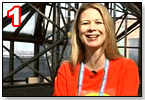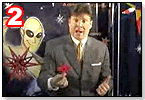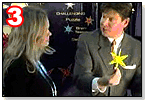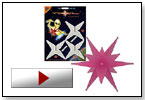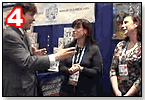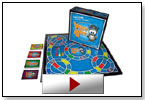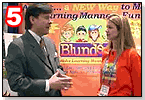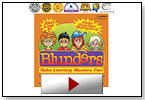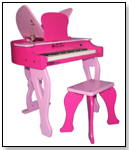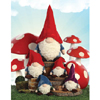|
|
Exhibitor Tips: Maximize Your Toy Fair ROI Avoid Mistakes That Could Make the Fair a FlopExhibiting at the American International Toy Fair can be overwhelming ... and expensive! TDmonthly Magazine's videos and articles can help prepare you and even show you what it's like. Here's what one newbie vedor told us: "Specifically seeing what worked and didn't work with the copy layout in the booth signage was very helpful. Knowing how important the 'interrupt' is made us rework our booth layout so that we can grab potential buyers in those important first 3 seconds." — Cat Chapman Smith, Artsee Fartsee, Jan. 2008  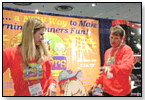 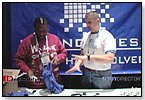 Watch the above rough cuts from our Toy Fair documentary, Toy Frenzy! to get a sense of what it's like to prepare for your first show. Featuring Frolicking Floatiners (left), Successful Kids (middle) and Beyond Chess (right). Then read through the following articles, watch the videos, and read video transcripts below for more tips on Toy Fair:
1. Amy Symington Has All Her Kids' Futures At Stake * Amy founded her company, Successful Kids, to help teach manners and etiquette to children. * After being prodded about a product parents could use on their own, she realized there was nothing on the market and decided to invent a game herself. * Inventing her manners game, Blunders, was much harder than she thought ... and much more expensive. * She and her husband had to raid their children's college funds to produce the game. * Editorial and video coverage from TDmonthly helped expose buyers to her product even before the Fair. 2. Voxal Booth Presentation — What's Wrong and What's Right * You need to keep your booth clear to allow the maximum number of buyers. * In 2 to 3 seconds, your booth must stop buyers dead in their tracks; otherwise, the booth has failed. * What will interrupt you? Your eye goes to the top of the booth, called the "Interrupt." * What does "Voxal.net" — this booth's interrupt — mean to a passerby? Nothing. Nobody cares what your company's name is until they know what you can do for them. * The information on the video component of this booth should be used, instead, as part of the interrupt, at the top of the booth. * The videotape should be used to educate the buyer and help him or her take the next low-risk step in the buying process. * This company has a one-dimensional product that can be assembled into a multidimensional piece of art: There's a wonderful inside realty, but this booth does not communicate this with precision to fulfill the marketing equation (IEEO = Results). 3. Voxal Boothmanship — Entice Buyers Into Your Booth * This booth doesn't have as effective an interrupt value as it should, so the booth master doesn't have much chance to engage passersby. * Saying "Hi, how are you?" won't stop anyone. They've heard it 700 times and will walk by your booth. * Engage potential buyers by quickly noticing their name tags and greeting them by name. Then ask a series of questions to determine what their needs are: * "Hi, Emily. I see you're an attendee at the show. You're obviously looking for solutions. What sort of challenging puzzles do you carry that actually help a child think mathematically and also help him create a piece of art?" * Once the buyer is engaged, invite him or her into the booth: "If I could, I'd like to share some of your valuable time ..." * Stress the unique function of your product and how it addresses the buyer's needs: "We take something flat, and assemble it into something multidimensional." * By engaging and educating the buyer, you can bring him or her to the next level of making a low-risk offer. * Any personality type can use these techniques. It's the technique that's important. 4. Griddly Games — Identify Your Selling Point * The owners of Griddly Games say they specialize in board games based on strategy, challenge and social interaction. When playing their games, kids learn that their actions have consequences. * Charles points out that there are consequences to moves in checkers, too. So what makes their games unique? * They describe their games as providing challenge, strategy and fun. Charles counters that he's heard the same thing from 500 other companies at Toy Fair. * He asks them, "What can you say — and support — that nobody else can say?" Their answer: "Socialization and customization." * He wants one example of how their games are customizable. They answer that the game "Wise Alec" has different levels of play, blank cards so that teachers can create their own question cards, and expansion sets with themes such as dinosaurs. * "What you're offering is a suit that actually fits," he sums up. * He advises them to get rid of all the text on their booth. Booths should only be used to convey one or two major benefits or reasons why the attendee should stop and approach. * A better interrupt than the name of their company and games would be: "The only customizable board games that are strategic, challenging and teach children social interaction." Under that: "Award-winning product. Learn more." * The owners are thrilled and say they'll be going back to the drawing board to incorporate Charles's suggestions. 5. Successful Kids — A Booth That Works * Since no one cares about the name of the company, you don't see that at the top of the Successful Kids booth. What you see is: "At Last ... A NEW Way to Make Learning Manners Fun!" * The word "new" is the most important word in the lexicon of exhibition. Seventy-six percent of attendees come to find out what's "new." * Stress "learning" instead of "teaching"; you can teach without anyone learning. * Next part of interrupt is: "Kids Love It. Adults Have Been Yearning for It." The booth provides proof for its claims in the form of prestigious testimonials. Always pretend that the marketplace is saying, "Oh yeah? Prove it!" * The star of the booth is not the company; it is the product: the game Blunders. * "At last!" Charles proclaims. "A strategic booth presentation that truly cuts through the clutter, captures the elusive attention span, that connects, and facilitates the decision-making process." * Next, Charles tests Aimee Symington of Successful Kids on her boothmanship skills. Boothmanship is the art of engaging people with a unique, open-ended invitation. It's getting them to talk about themselves and their current business objectives. * Aimee's question to Charles as a passerby is, "How do your customers feel about manners?" He's only partially engaged and she persists by asking him if his customers might like a game that makes learning manners fun. * Always approach attendees before they walk away and keep them engaged as graciously and respectfully as possible with open-ended, unique questions. Research shows that if a buyer leaves your booth, he or she is extremely unlikely to return. * Aimee asked a lot of yes-and-no questions, Charles says. It might be better to say, "Tell me a little bit about how your customers care about how their children learn manners, and how that could translate into serious profit for your store. It could help me and I might be able to help you. Is that fair?" * Charles encourages Aimee to engage buyers with unique, open-ended questions that address their central concerns, which are sales and profit.  Writer's Bio: ALISON MAREK is an award-winning writer, director and cartoonist whose work has been published by Fairchild Publications and DC Comics (Piranha Press), broadcast on Showtime and other cable networks, and viewed worldwide in film festivals. See her short films and print work on www.alisonmarek.com. Watch her nefarious villains in the web series www.MuggsMovers.com. Get inspired by her cartoons "Daily ARFFirmations to Unleash Your Inner Fido" at www.ARFFirmations.com. Phew! And then ... Read more articles by this author Writer's Bio: ALISON MAREK is an award-winning writer, director and cartoonist whose work has been published by Fairchild Publications and DC Comics (Piranha Press), broadcast on Showtime and other cable networks, and viewed worldwide in film festivals. See her short films and print work on www.alisonmarek.com. Watch her nefarious villains in the web series www.MuggsMovers.com. Get inspired by her cartoons "Daily ARFFirmations to Unleash Your Inner Fido" at www.ARFFirmations.com. Phew! And then ... Read more articles by this author |
| |||||||||||||||||||||||||||||||||||||||||
Disclaimer Privacy Policy Career Opportunities
Use of this site constitutes acceptance of our Terms of Use.
© Copyright 2025 PlayZak®, a division of ToyDirectory.com®, Inc.

